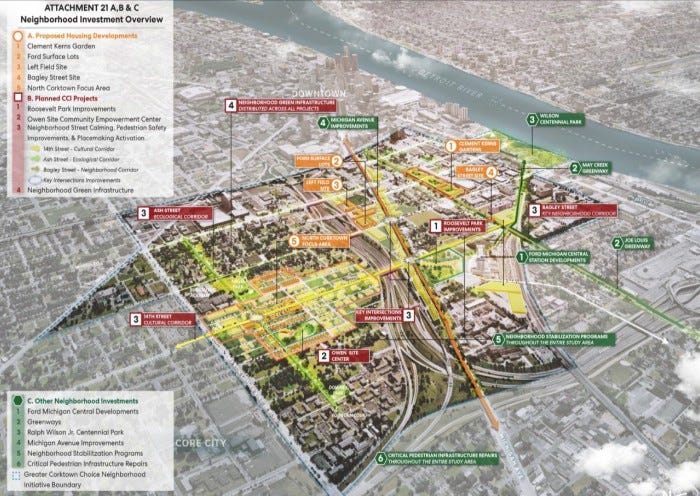
DETROIT (WWJ) -- The revitalization of Detroit’s historic Corktown neighborhood is well underway, but it’s set to receive a boost in the form of a $30 million grant from the U.S. Housing and Urban Development.
HUD secretary Marcia L Fudge announced Wednesday that Corktown is one of five communities across the country that will receive a combine $160 million to redevelop severely distressed housing and spur comprehensive revitalization under the federal Choice Neighborhoods Initiative.
Neighborhoods in Cleveland, OH, Camden, NJ, Fort Myers, FL and Lewiston, ME will also receive grants.
On top of the $30 million grant, HUD says an additional $993.3 million will be leveraged through local funding.
“Since its creation, the Choice Neighborhoods initiative has transformed communities across the nation,” Fudge said in a press release. “Today’s announcement will support local vision for reinvigorating low-income communities into areas of opportunity—whether it be with regard to housing, health, education, childcare, or jobs. I applaud each of the five communities for their commitment to ensuring affordable housing serves as a platform for community innovation and individual advancement.”
Corktown, lying just west of downtown, is one of Detroit’s oldest established neighborhoods, once home to a large population of Irish immigrants. Like much of the city, the neighborhood has experienced blight and population loss.
But in recent years, the neighborhood has begun to experience unprecedented growth, with new businesses, restaurants and projects like The Corner Ballpark at the site of the old Tiger Stadium at the corner of Michigan and Trumbull and Ford Motor Co.’s redevelopment of the vacant Michigan Central Station.
But with that revitalization, city officials say the Corktown neighborhood is seeing quickly escalating rent rates. Corktown is now in line to see more than $200 million invested in 840 new housing units to be completed over the next six years. The city says at least 60% of those units will be set aside as “deeply affordable housing units to ensure that Detroiters of all income levels can afford to live there.”
Officials say 40% of the new units will be reserved for households earning between 30-80% area median income (AMI) or no more than $50,000 for a two-person household. Twenty percent of the units will serve households making up to 30% AMI or no more than $19,000 for a two-person household.
Additionally, 20% of the new units will serve households earning between 80-120% AMI, or no more than $76,000, while the remaining 20% of the units will be sold at market rates.
HUD officials say the community-driven plan will ensure the neighborhood remains one that is vibrant, diverse and provides opportunity for all residents as it undergoes revitalization.
“With the award of the Choice Neighborhoods grant, the City of Detroit and its partners will replace the distressed 87-unit, HUD-assisted Clement Kern Gardens Apartments with over 800 units of mixed-income housing,” HUD officials said.
The grant will also help enhance public spaces, integrate green infrastructure and create a Community Empowerment Center. HUD says “these physical investments will be paired with tailored health, employment and education supports for the families living at Clement Kern Gardens Apartments.”
The Clement Kern Gardens Apartments were built in the 1980s in a way that HUD says “isolated the apartments from the surrounding neighborhood.”
The new plan to revitalize the neighborhood includes making sure the existing Corktown residents, and specifically the residents of Clement Kern Gardens, are not left behind or displaced by the unparalleled investments.
Two neighborhood parks will be revitalized as part of a network of green spaces, while green infrastructure and active landscapes will be integrated throughout Corktown.
Major corridors will also be improved with safer intersections, better circulation and landscaping to ensure safe pathways for pedestrians.
Among 15 local partners that will contribute to the revitalization are the Detroit Public Schools Community District, Detroit Riverfront Conservancy, Ford Motor Company, Wayne State University and the Michigan Department of Transportation.
Choice Neighborhoods is focused on three core goals:
Housing: Replace distressed public and assisted housing with high-quality mixed-income housing that is well-managed and responsive to the needs of the surrounding neighborhood;
People: Improve outcomes of households living in the target housing related to employment and income, health, and children’s education; and
Neighborhood: Create the conditions necessary for public and private reinvestment in distressed neighborhoods to offer the kinds of amenities and assets, including safety, good schools, and commercial activity, that are important to families’ choices about their community.


